

Post Lyme Disease Syndrome - Lyme Disease. Approximately 10 to 20% of patients treated for Lyme disease with a recommended 2–4 week course of antibiotics will have lingering symptoms of fatigue, pain, or joint and muscle aches.
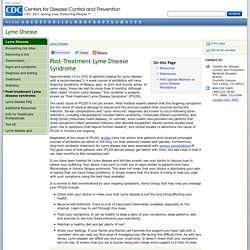
In some cases, these can last for more than 6 months. Although often called "chronic Lyme disease," this condition is properly known as "Post-treatment Lyme Disease Syndrome" (PTLDS). The exact cause of PTLDS is not yet known. Most medical experts believe that the lingering symptoms are the result of residual damage to tissues and the immune system that occurred during the infection. Similar complications and "auto–immune" responses are known to occur following other infections, including Campylobacter (Guillain-Barre syndrome), Chlamydia (Reiter's syndrome), and Strep throat (rheumatic heart disease).
Regardless of the cause of PTLDS, studies have not shown that patients who received prolonged courses of antibiotics do better in the long run than patients treated with placebo. . References Human research. Lyme Disease Symptoms and Treatment. Why do I need to register or sign in for WebMD to save?

We will provide you with a dropdown of all your saved articles when you are registered and signed in. Lyme disease is a bacterial infection transmitted by a tick. Lyme disease was first recognized in 1975, after researchers investigated why unusually large numbers of children were being diagnosed with juvenile rheumatoid arthritis in Lyme, Conn., and two neighboring towns. The investigators discovered that most of the affected children lived near wooded areas likely to harbor ticks. They also found that the children's first symptoms typically started in the summer months coinciding with the height of the tick season.
Several of the patients reported having a peculiar skin rash just before developing arthritis symptoms, and many also recalled being bitten by a tick at the rash site. The ticks most commonly infected with B. burgdorferi usually feed and mate on deer during part of their life cycle. Continue reading below... Post Lyme Disease Syndrome - Lyme Disease. It is not uncommon for patients treated for Lyme disease with a recommended 2 to 4 week course of antibiotics to have lingering symptoms of fatigue, pain, or joint and muscle aches at the time they finish treatment.
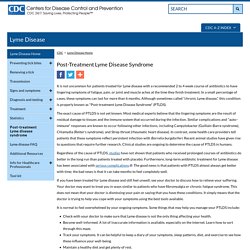
In a small percentage of cases, these symptoms can last for more than 6 months. Although sometimes called "chronic Lyme disease," this condition is properly known as "Post-treatment Lyme Disease Syndrome" (PTLDS). The exact cause of PTLDS is not yet known. Most medical experts believe that the lingering symptoms are the result of residual damage to tissues and the immune system that occurred during the infection. Similar complications and "auto–immune" responses are known to occur following other infections, including Campylobacter (Guillain-Barre syndrome), Chlamydia (Reiter's syndrome), and Strep throat (rheumatic heart disease). If you have been treated for Lyme disease and still feel unwell, see your doctor to discuss how to relieve your suffering. References Marques, A. Chronic Lyme Disease (PTLDS)
Why do I need to register or sign in for WebMD to save?

We will provide you with a dropdown of all your saved articles when you are registered and signed in. With treatment and time, the symptoms of Lyme disease, which is caused by a tick bite, usually get better. If you are diagnosed with Lyme disease, you’re usually given antibiotics for 2-4 weeks. When symptoms linger well beyond the typical treatment time, you may have what's called "post-treatment Lyme disease syndrome" (PTLDS). It’s also called "chronic Lyme disease.
" A wide range of effects from PTLDS can go on for months. Fatigue The hallmark problem of PTLDS is feeling tired. Arthritis and Joint Pain Continue reading below... Symptoms - Lyme Disease. Skip directly to search Skip directly to A to Z list Skip directly to navigation Skip directly to page options Skip directly to site content CDCLyme Disease Home Signs and Symptoms of Untreated Lyme Disease Recommend on Facebook Tweet.
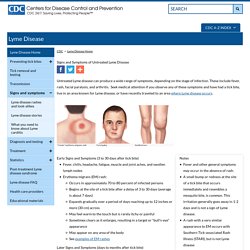
A ‘huge question’ about Lyme: Why do some patients report lingering symptoms? Readers describe dealing with Lyme disease and feuding with health-care providers. Lyme disease victims relate their stories In “Baffled by chronic Lyme disease” [Mar. 6], Laurie McClellan described the struggle that began when her husband’s symptoms, notably overwhelming fatigue, were diagnosed as chronic Lyme disease, a condition not recognized by some medical experts.

Many readers wrote to tell us of similar experiences. A few excerpts are printed here. I was a Marine co-pilot when I became ill. The military sent me to virtually every specialist they could, but no doctor could find a unifying diagnosis for my 40-plus symptoms. The military told me that if I recovered I might have the option of returning to flying, but that I would need a waiver for Lyme disease.
After a two-year battle I was medically retired from the military. Luke D. Frequently Asked Questions - Lyme Disease. Diagnosis, Testing, and Treatment I've been bitten by a tick.
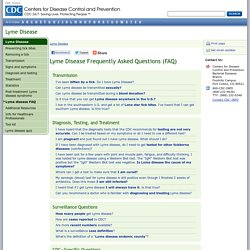
Do I have Lyme disease? If you have not done so already, remove the tick with fine-tipped tweezers. The chances that you might get Lyme disease from a single tick bite depend on the type of tick, where you acquired it, and how long it was attached to you. Many types of ticks bite people in the U.S., but only blacklegged ticks transmit the bacteria that cause Lyme disease. If you develop illness within a few weeks of a tick bite, see your health care provider right away. Burrascano.symptoms. Dr. Wayne Anderson. Advanced Alternatives in Integrative Medicine - Gordon Medical Associates. Wayne Anderson, ND "Patient care must integrate mind and body, incorporating the strengths of alternative and conventional medicine, and tailoring a program that recognizes the uniqueness of each person.
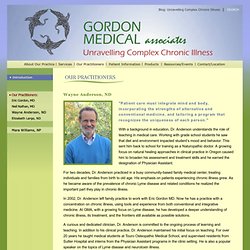
" With a background in education, Dr. Anderson understands the role of teaching in medical care. Working with grade school students he saw that diet and environment impacted student’s mood and behavior. This sent him back to school for training as a Naturopathic doctor. For two decades, Dr. In 2002, Dr. A curious and dedicated clinician, Dr. For more than 25 years, Dr. An avid film historian and true music enthusiast, Wayne spends his spare time watching movies-old and new-and listening to a wide selection of music.
Dr. Lyme DiseaseTreatment Protocols Mold Protocols Naturopathic Medicine Detoxification Leaky Gut Syndrome: Dysbiosis Protocols Functional Medicine Autoimmune Disease Protocols Multiple Chemical Sensitivities (MCS) Protocols Bioidentical Hormones Frequency Specific Microcurrent.